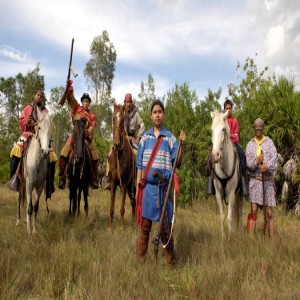Like us on Facebook, LinkedIn, and YouTube. Get the latest episode without delay where and when you want it by subscribing through your favorite podcast catcher, such as iHeart, Stitcher, Spotify, DoubleTwist, Pandora, Podbean, Google podcasts, iTunes or directly from the Seminole Wars Foundation website www.seminolewars.us

Saturday Apr 24, 2021
SW053 Seminole Frustrated Army by Fighting 2SW on Its Terms, not by Military Expectations

Reenactment photo (courtesy)
At times in its history, the US Army has personified the admonition that those who forget the past are condemned to repeat it. This is especially disconcerting since the US Army has been the architect of its past and yet, as in the case of unconventional conflicts, it has often sought to bury those memories in favor of a pledge never to fight in such ways again. The reality is that the Army does not usually get to choose what type of war it fights; its political leaders choose. The unconventional guerrilla-style operations of the Second Seminole War are a prime case in point.
With us today to discuss how the Army wanted to fight the Second Seminole War versus how the Seminole forced them to fight, and how its leaders adapted is Dr. James S. Robbins. He is an author, political commentator and professor, with expertise in national security, foreign and military affairs, military history, and American politics.

Reenactors fire volleys against Seminole practicing guerilla war tactics (Courtesy Photo)
Dr. Robbins’ books include Last in Their Class: Custer, Pickett and the Goats of West Point. During his years in government service, he directed the U.S. Intelligence Community Center for Academic Excellence, and also taught International Relations at the National Defense University, and the United States Marine Corps Command and Staff College. His insights gained from Last in Their Class inform our discussion today about adaptability against adversity.
Host Patrick Swan is a board member with the Seminole Wars Foundation. He is a combat veteran and of the U.S. Army, serving in Iraq, Afghanistan, Kuwait, and Kosovo, and at the Pentagon after 9/11. A military historian, he holds masters degrees in Public History, Communication, and Homeland Security, and is a graduate of the US Army War College with an advanced degree in strategic studies. This podcast is recorded at the homestead of the Seminole Wars Foundation in Bushnell, Florida.
No comments yet. Be the first to say something!